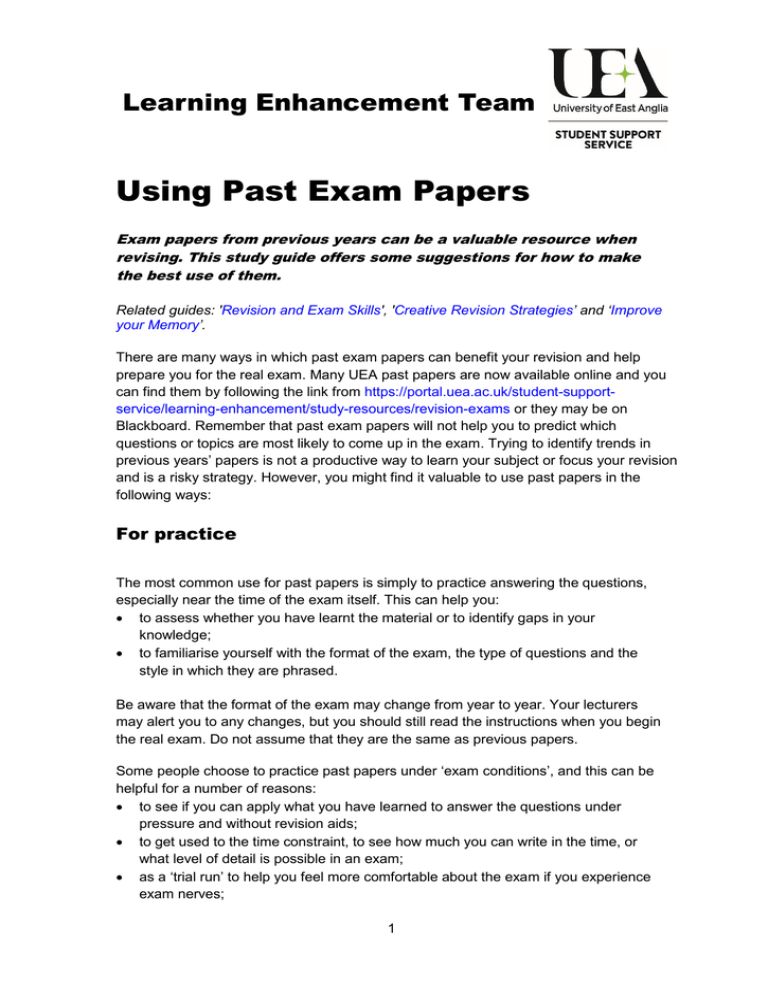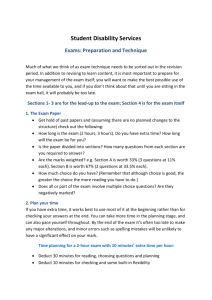Using Past Papers
advertisement

Learning Enhancement Team Using Past Exam Papers Exam papers from previous years can be a valuable resource when revising. This study guide offers some suggestions for how to make the best use of them. Related guides: 'Revision and Exam Skills', 'Creative Revision Strategies’ and ‘Improve your Memory’. There are many ways in which past exam papers can benefit your revision and help prepare you for the real exam. Many UEA past papers are now available online and you can find them by following the link from https://portal.uea.ac.uk/student-supportservice/learning-enhancement/study-resources/revision-exams or they may be on Blackboard. Remember that past exam papers will not help you to predict which questions or topics are most likely to come up in the exam. Trying to identify trends in previous years’ papers is not a productive way to learn your subject or focus your revision and is a risky strategy. However, you might find it valuable to use past papers in the following ways: For practice The most common use for past papers is simply to practice answering the questions, especially near the time of the exam itself. This can help you: to assess whether you have learnt the material or to identify gaps in your knowledge; to familiarise yourself with the format of the exam, the type of questions and the style in which they are phrased. Be aware that the format of the exam may change from year to year. Your lecturers may alert you to any changes, but you should still read the instructions when you begin the real exam. Do not assume that they are the same as previous papers. Some people choose to practice past papers under ‘exam conditions’, and this can be helpful for a number of reasons: to see if you can apply what you have learned to answer the questions under pressure and without revision aids; to get used to the time constraint, to see how much you can write in the time, or what level of detail is possible in an exam; as a ‘trial run’ to help you feel more comfortable about the exam if you experience exam nerves; 1 You could also use them with a friend from your course, and mark each other’s paper. This will help you understand how markers read your answers, and show you how others approach the question. For focus and organisation However, you could also use past papers earlier in the revision process: by comparing them with the module outline and lecture notes to get an idea of the full range of topics which may come up in the exam; as a starting point for organising and selecting your revision topics. When drawing up a list of topics that need to be revised, you could begin by working backwards from past papers –what would you have needed to know to answer those questions? This may be a less overwhelming way to begin rather than by condensing all your lecture notes, etc. by giving you an idea of how much detail would be expected in answers, so that you avoid revising in unnecessary depth. An exam answer is often not as detailed as a coursework assignment. Try answering a question using your revision notes, and see how long and detailed your answer is. Could you realistically expect to write this much in an exam under a time limit? Would you reasonably be expected to memorise that level of detail, and is this primarily what the exam tests? An exam tests your ‘working’ knowledge – your grasp of the essential or fundamental elements of your subject, so that you can use it practically to answer any given question. This is a different skill from the ability to research very focussed, specific information to prepare for a specific coursework question in detail, but not memorise it. to practise drawing together your information and synthesising an answer by answering them with your revision notes at hand. For deeper learning You can also use past papers to get an insight into the assessment process: to think about what you will be asked to do with the information you are learning – how you will be asked to apply it and for what sorts of tasks. If you focus only on learning information, you may find it harder to use it well in the exam if you haven’t considered the higher skills that exams test, such as analysis, applying a theory, justifying an approach or constructing an argument. analyse them to find out not just what topics might come up, but the sort of questions that are asked, and how they phrase them. You will find it easier in the exam to understand what is being asked of you if you familiarise yourself with the way questions are expressed and what is meant by instruction words such as ‘discuss’ or ‘compare and contrast’. when you are revising, ask yourself what kinds of questions might be asked about the material you are learning, using past papers on similar topics as a guide. 2 use them as templates to generate questions of your own. Substitute the topic for a different one, or adapt different questions to suit one topic. You can then use the new questions as extra practice, but it also gives you an insight into the mind of the examiner. If you were setting this exam, what questions would you ask? For example, here are questions from different subjects, which are nonetheless very similar in their phrasing: Discuss the concept of a ‘species’ in both microbes and invertebrates. Discuss the theme of nature in Emily Dickinson’s poetry. To what extent do museum buildings affect the ‘museum experience’? To what extent is the Milankovitch Theory of climate change supported by palaeoclimate data from the last five million years? What are the characteristics of identity in the postmodern condition? Describe the characteristics of mean global surface temperature change during the last 150 years. You could rework these questions by exchanging the topic for another one from your revision. Similarly, sometimes questions can be phrased differently, but still essentially ask the same thing, and it is good experience to get used to the different ways in which a question might be phrased: Assess the argument that the procedures at the ECB add to the difficulties of controlling inflation in the Euro zone. Critically evaluate the contribution of quantitative studies of heritability to understanding individual differences in intelligence and personality. Why might birds be described as ‘glorified reptiles’? Is it accurate to describe birds as ‘glorified reptiles’? ‘Birds are glorified reptiles.’ Discuss. If there are no past papers, it is still worth looking at papers from similar subjects to see how questions are phrased, and try to create questions of your own to suit your subject. 3 Want to know more? If you have any further questions about this topic you can make an appointment to see a Learning Enhancement Tutor in the Student Support Service, as well as speaking to your lecturer or adviser. Call: Ask: Click: 01603 592761 ask.let@uea.ac.uk https://portal.uea.ac.uk/student-support-service/learning-enhancement There are many other resources to help you with your studies on our website. Your comments or suggestions about our resources are very welcome. Scan the QR-code with a smartphone app for more resources. 4



